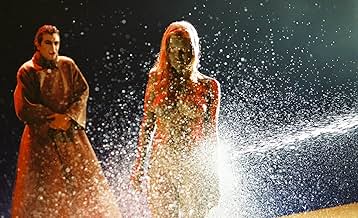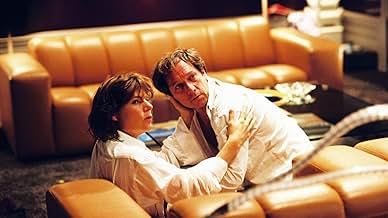Cloaca
- Fernsehfilm
- 2003
- 1 Std. 48 Min.
IMDb-BEWERTUNG
7,4/10
1977
IHRE BEWERTUNG
Füge eine Handlung in deiner Sprache hinzuFour old college friends in their forties come together in a time of trouble and despair. Old joy relives, but the harsh reality of their problems can't satisfy them and eventually endangers... Alles lesenFour old college friends in their forties come together in a time of trouble and despair. Old joy relives, but the harsh reality of their problems can't satisfy them and eventually endangers their friendships.Four old college friends in their forties come together in a time of trouble and despair. Old joy relives, but the harsh reality of their problems can't satisfy them and eventually endangers their friendships.
- Auszeichnungen
- 8 Gewinne & 1 Nominierung insgesamt
Empfohlene Bewertungen
A cloaca is the rear body opening of an animal that serves as the only opening for the digestive (rectum), reproductive, and urinary tracts (Wikipedia). In this film however it is the word with which a group of study friends greet each other. They did so when they were at the university and they still do as forty-somethings. Being Latin in origin the word sounds chic but has a rather down to earth meaning.
There are many films about study friends meeting each other at a reunion later in life. "The big chill" (1983, Lawrence Kasdan) and "The return of the secaucus 7" (1979, John Sayles) comes to my mind. Although I have seen neither of them I think I can imagine the main theme. Former idealism has gone and boring daily routine has taken its place.
"Cloaca" is different. In Cloaca the main characters are not just disillusioned, their life is a mess.
Joep (Gijs Scholten van Aschat) is hoping to become minister in the next government but at the same time his marriage is such a wreck that his wife has put him outside the house.
Maarten (Jaap Spijkers) is a director just before the opening night of his new play. He has an affair with one of the actresses, bareley 18 years old. This actress turns out to be the daughter of Joep.
Tom (Peter Blok) is a lawyer recovering from a cocaine addiction.
Pieter (Pierre Bokma) is a civil servant working on the department that implements the subsidy scheme for artists. Every year at his birthday he is allowed to handpick a painting that otherwise would be stored in the municipal warehouse. This arrangement is however unofficial. When a painter dies and his work becomes very expensive the municipality wants his work back. In the meantime Pieter has however sold some of the paintings to cover daily expenses.
When these troubled friends come together the central question is if their problems have made them selfish or is there still some loyalty left? The answer is only given at the denouement. Up till then there is a "not with or without you" sentiment between men only. The dialogues are razor sharp reminding me of "Who is afraid of Virginia Woolf' (1966, Mike Nichols), although in this film the "not with or without you" sentiment relates to a marriage and not to a friendship.
There are some comic scenes, such as the silly dance on the music of Madness the friends perform for Joep at his birthday. Most of all however I remember some beautiful images. One of them is the actress (yes the one Maarten is having an affair with) smeared with mud that is rinsed off her naked body during the final scene of the play. This image made it to the poster. More impressive and more meaningful however is the image of a boat with four student on it sailing through the canals of the city. One student is playing a piano, the others are drinking beer. This image occurs twice in the movie. Is it real or is it a memory? I am inclined to think the last.
There are many films about study friends meeting each other at a reunion later in life. "The big chill" (1983, Lawrence Kasdan) and "The return of the secaucus 7" (1979, John Sayles) comes to my mind. Although I have seen neither of them I think I can imagine the main theme. Former idealism has gone and boring daily routine has taken its place.
"Cloaca" is different. In Cloaca the main characters are not just disillusioned, their life is a mess.
Joep (Gijs Scholten van Aschat) is hoping to become minister in the next government but at the same time his marriage is such a wreck that his wife has put him outside the house.
Maarten (Jaap Spijkers) is a director just before the opening night of his new play. He has an affair with one of the actresses, bareley 18 years old. This actress turns out to be the daughter of Joep.
Tom (Peter Blok) is a lawyer recovering from a cocaine addiction.
Pieter (Pierre Bokma) is a civil servant working on the department that implements the subsidy scheme for artists. Every year at his birthday he is allowed to handpick a painting that otherwise would be stored in the municipal warehouse. This arrangement is however unofficial. When a painter dies and his work becomes very expensive the municipality wants his work back. In the meantime Pieter has however sold some of the paintings to cover daily expenses.
When these troubled friends come together the central question is if their problems have made them selfish or is there still some loyalty left? The answer is only given at the denouement. Up till then there is a "not with or without you" sentiment between men only. The dialogues are razor sharp reminding me of "Who is afraid of Virginia Woolf' (1966, Mike Nichols), although in this film the "not with or without you" sentiment relates to a marriage and not to a friendship.
There are some comic scenes, such as the silly dance on the music of Madness the friends perform for Joep at his birthday. Most of all however I remember some beautiful images. One of them is the actress (yes the one Maarten is having an affair with) smeared with mud that is rinsed off her naked body during the final scene of the play. This image made it to the poster. More impressive and more meaningful however is the image of a boat with four student on it sailing through the canals of the city. One student is playing a piano, the others are drinking beer. This image occurs twice in the movie. Is it real or is it a memory? I am inclined to think the last.
The story about four men in their mid-life crisis is well written and does not loose focus at any moment. Convincing actors. I did not like the scene with the prostitute. All scenes are realistic and seem to come out of really every-day life. The psychology of the friends is well described by strong dialogue.
Any man should recognize himself in one of the four male characters in this picture. The way these men try (!) to open up to each other demonstrates the difficulties men always had and will have to deal with emotions, friendship, loyalty and relationships. With some (hilarious) subtle jokes, intertwined in strong dialogs and acting, these topics are clearly not men's favorite. Yet, this picture demonstrates that men are eager to to be sensing creatures, even if nature did not make them that way. Women should see this movie instead of any Oprah-like show about understanding the opposite sex. At least one woman has these insights and she wrote this wonderful story!
This is a wonderful drama, originally a play but successfully transformed to cinema. By that I mean that the superb writing is supplemented by images which carry the load.
It is the story of four men who in college had a band called Cloaca. We encounter them 20 years later, each with problems we identify. This all rings true, so true and so closely written that I would probably like it even it were a filmed play.
That's because of the way it is constructed. Each of the men and all of the possible pairings by turns take the role of being outside the play, on the side of the viewer, commenting on the others. This fold is made explicit by two devices. One involves paintings from an artist whose passion is remarked upon and who clearly reflects on the pictures we see. This is one case where the structure is more apt for film than stage.
The other device is more visual (as we never see the paintings). One of the men is a playwright/director who is putting on a play that manipulates this notion of the chorus in the action. He is having sex with a girl in the play who has a central role in that play, and who also happens to be the daughter of one of the other men. Her role in the play is one of the most striking scenes in film: she is covered in some sort of mud and is hosed down to become nude. Its really quite beautiful, interspersed with shots of her disapproving father in the audience being struck by that beauty. Now this fold would have worked better in the stage production I suppose.
There's no question but that this is a guy movie, and proudly not silly. There is no compromise in the dramatic arc to land you in a happy ending. It seems true, and real, and a genuine voyage into what men actually deal with.
A subtle point: all of these men have noble moments but are all damaged in ways that allow them to damage. This is common. But this business about weaving the drama by having subgroups of two among the four take control, well I find that fascinating. Women simply do not do this in my experience, and never in film. Its a turbulent, shifting set of alliances based on direct relaxing of dominance to form partnerships, which then jointly dominate. The result is an essay on the nature of dominant control of the situation, heightened by the fact that we are there only to experience what they control.
A "cloaca" is a single orifice that serves sexual and all elimination needs.
Ted's Evaluation -- 3 of 3: Worth watching.
It is the story of four men who in college had a band called Cloaca. We encounter them 20 years later, each with problems we identify. This all rings true, so true and so closely written that I would probably like it even it were a filmed play.
That's because of the way it is constructed. Each of the men and all of the possible pairings by turns take the role of being outside the play, on the side of the viewer, commenting on the others. This fold is made explicit by two devices. One involves paintings from an artist whose passion is remarked upon and who clearly reflects on the pictures we see. This is one case where the structure is more apt for film than stage.
The other device is more visual (as we never see the paintings). One of the men is a playwright/director who is putting on a play that manipulates this notion of the chorus in the action. He is having sex with a girl in the play who has a central role in that play, and who also happens to be the daughter of one of the other men. Her role in the play is one of the most striking scenes in film: she is covered in some sort of mud and is hosed down to become nude. Its really quite beautiful, interspersed with shots of her disapproving father in the audience being struck by that beauty. Now this fold would have worked better in the stage production I suppose.
There's no question but that this is a guy movie, and proudly not silly. There is no compromise in the dramatic arc to land you in a happy ending. It seems true, and real, and a genuine voyage into what men actually deal with.
A subtle point: all of these men have noble moments but are all damaged in ways that allow them to damage. This is common. But this business about weaving the drama by having subgroups of two among the four take control, well I find that fascinating. Women simply do not do this in my experience, and never in film. Its a turbulent, shifting set of alliances based on direct relaxing of dominance to form partnerships, which then jointly dominate. The result is an essay on the nature of dominant control of the situation, heightened by the fact that we are there only to experience what they control.
A "cloaca" is a single orifice that serves sexual and all elimination needs.
Ted's Evaluation -- 3 of 3: Worth watching.
It's been a while since I saw this film, but the one thing I remember best is the fact I was so unimpressed by the acting. While I was still living in Holland, a friend of the family said: 'if you want to see the creme de la creme of Dutch acting, rent this film!' So I did and I wasn't impressed in the least by the unconvincing Dutch actors. Seeing British and (fair enough) a few American actors on screen, you believe they are the people they're portraying. But in this film, I'm sad to say, I had the feeling that the four main actors were very uncomfortable, undoubtedly did their best, but the outcome is nothing much... If you like arty films and are a fan of any of the actors, go and rent it... But if you really want to see a good Dutch film, rent 'Van God Los'. That was far better than this, (this was, to sum up: a rather weak effort to make it feel like a good film). and based on real events.
Wusstest du schon
- WissenswertesThe movie is based on the successful stage play with the same name, also written by Maria Goos. The four main actors are the same as in the theatre version.
- VerbindungenFeatured in De wereld draait door: Folge #10.11 (2014)
Top-Auswahl
Melde dich zum Bewerten an und greife auf die Watchlist für personalisierte Empfehlungen zu.
Details
- Erscheinungsdatum
- Herkunftsland
- Sprachen
- Auch bekannt als
- Cloaca - Alte Freunde
- Drehorte
- Produktionsfirmen
- Weitere beteiligte Unternehmen bei IMDbPro anzeigen
Box Office
- Weltweiter Bruttoertrag
- 1.021.317 $
- Laufzeit
- 1 Std. 48 Min.(108 min)
- Farbe
- Sound-Mix
- Seitenverhältnis
- 1.85 : 1
Zu dieser Seite beitragen
Bearbeitung vorschlagen oder fehlenden Inhalt hinzufügen



























